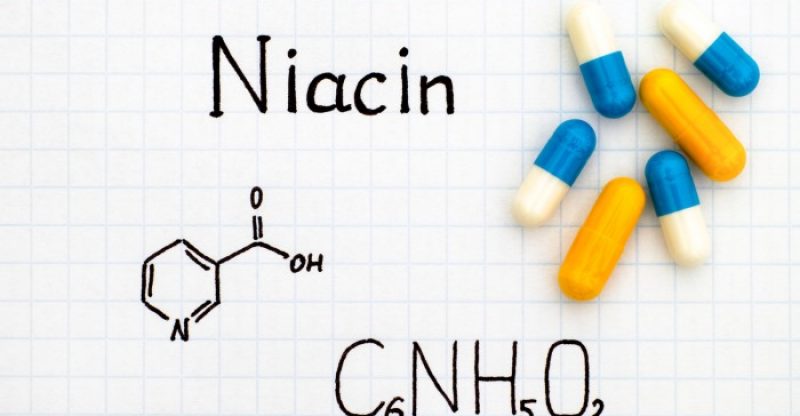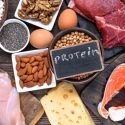12 Evidence-Based Benefits of Vitamin B3 (Niacin)
According to the Center for Disease Control (CDC), over 95 million of Americans have high cholesterol, which means their total cholesterol levels are at 200 mg/dL or above.
A significant number of those people have cholesterol levels that are over 240 mg/dL.
Those individuals are at an even higher risk for heart disease.
One of the primary medications used to help lower high cholesterol is Niacin.
What is Niacin? What are Niacin’s side effects?
What are Niacin’s benefits, in addition to lowering cholesterol?
All of these are questions that this article will address, in addition to providing eleven or more Vitamin B3 benefits.
What is Vitamin B3/Niacin?
Proper nutrition is the key to keeping our bodies healthy and strong.
One nutrient that plays an important part in our good health is Niacin.
But what is Niacin? Vitamin B3 is another name for Niacin.
And another name for Niacin is nicotinic acid.
Throughout this article, we will use the terms Vitamin B3 and Niacin interchangeably.
When our bodies have enough Vitamin B3, our body is able to function the way it’s supposed to.
We get Vitamin B3 naturally from the foods we eat.
There are eight Vitamin B vitamins that help our bodies convert the food we eat into fuel, which it uses to produce energy.
These vitamins are Thiamin, Riboflavin, Niacin, Biotin, Pantothenic Acid, Pyridoxine, Folate, and Cobalamin.
Vitamin B3 is one of the eight.
In addition to helping to produce fuel, these vitamins affect the health of our liver, skin, hair, and eyes, and help make sure our nervous system functions properly.
Our bodies get Niacin every day from eating Niacin-rich foods.
Since Niacin is a water-soluble B vitamin that it is not stored in the body, the body discharges any excess.
Our body also gets Niacin from the amino acid tryptophan.
All of the Vitamin B3 our body needs is available by eating a proper diet.
There are two main chemical forms of Niacin. Each one affects the body differently.
Both forms of Niacin are available in foods, as well as supplements.
The first one is Nicotinic acid.
It is a supplement used to lower high levels of cholesterol and to help prevent heart disease.
The other form, called Niacinamide, or nicotinamide, cannot lower cholesterol levels, but it can do help treat some skin conditions, type 1 diabetes, and schizophrenia.
Other Vitamin B3 benefits are its ability to ease arthritis and boost brain function.
Signs of Nicacin Deficiency
The best way to ensure getting a sufficient amount of Niacin is by eating a healthy diet.
If you eat poorly, it could result in you having a vitamin deficiency.
If this occurs, your doctor will most likely recommend that you take a multivitamin.
Vitamins help the body’s ability to break down natural substances that it requires being healthy.
When you do not get enough Niacin or nicotinic acid, you develop a condition called Pellagra.
Basically, what happens is that the body fails to absorb the amino acid tryptophan, which it uses to convert to Niacin.
The symptoms of Pellagra include skin lesions and gastrointestinal and neurological disturbances commonly referred to as the four Ds of pellagra: dermatitis, diarrhea, dementia, and death.
Poor diet habits or long-term use of certain medications can create a Niacin deficiency.
Hartnup disease, malabsorption syndrome, and alcohol abuse are a few of the medical conditions that can also cause Niacin deficiency.
The hartnup disease occurs where the person’s body does not have the ability to absorb protein building blocks (amino acids) from the diet.
The small intestines digest the majority of the food a person eats, but for people with a malabsorption syndrome, the small intestine cannot absorb the nutrients their body needs from that food.
Abusing alcohol over an extended period of time can lead to an increased risk of certain cancers, stroke, and liver diseases.
Chronic depression, fatigue, indigestion, vomiting, poor circulation, and canker sores could be due to a deficiency in Vitamin B3, also known as Pellagra.
Persons with Pellagra will have cracked or scaly skin, dementia, and diarrhea.
Skin lesions caused by the skin being abnormally sensitive to sunlight may appear on the portion of their arms, legs, and neck that are exposed to the sun.
These lesions may look like a severe case of sunburn at first.
The person will also have diarrhea, along with inflammation of the mouth and the tongue.
Their lips and corners of the mouth will be dry, scaling, and cracked.
In most cases, the neurological symptoms will appear later, after the other symptoms are pronounced.
Dementia may manifest next in the form of apathy, confusion, depression, and delirium.
The treatment for Pellagra includes Niacin supplements and putting patients on a nutritionally-balanced diet.
If left untreated, the person can experience major organ failure and die.
Health Benefits of Niacin
Reduces Symptoms of Arthritis
Arthritis is the term most people use when referring to a joint disease or joint pain.
However, there is not one single disease called arthritis, but over 100 different types.
Osteoarthritis and rheumatoid arthritis are the most common types of arthritis.
In osteoarthritis, there is a breakdown in the cartilage covering the bones.
Rheumatoid arthritis is an autoimmune disorder that attacks the lining of joints.
As a person becomes older, the more likely they are to suffer from arthritis.
Reportedly, 50 million-plus adults suffer from arthritis.
Also, 300,000 children have received a diagnosis of some form of arthritis.
Among those who have been diagnosed with a joint disease and joint pain from arthritis, it is found to be more common among women than men, and occur more frequently as they get older.
In a study, Niacin helped ease some of the symptoms of osteoarthritis and improved the mobility of the joints.
Those who participated in the study and received Niacin did not require as much nonsteroidal anti-inflammatory drugs (NSAIDs).(1)
The most commonly-used over-the-counter NSAIDs are aspirin and ibuprofen.
Other studies conducted using lab rats found that an injection of Vitamin B3 reduced the swelling related to arthritis.
For those who experience pain from arthritis, the study results are encouraging, but there has to be more research done.
Lower Risk of Alzheimer’s Disease
As some people become older they experience a brain disease called Alzheimer’s, where they slowly lose their memory.
It is a form of dementia that normally manifests in someone who is middle-aged or old age.
People diagnosed with Alzheimer’s are usually 65 years old or older.
At first, they have trouble remembering recent events, although their long-term memory is still intact.
As time progresses, the person will have trouble concentrating and performing simple tasks.
This condition could cause the person to become confused because they don’t understand what is happening to them.
They may become angry and have emotional outbursts, and experience depression or anxiety.
This disease is especially difficult for family members and loved ones because the person suffering from Alzheimer’s no longer recognizes their loved ones as time passes.
The cause of Alzheimer’s disease is unknown.
Some studies suggest that people who have high blood pressure and high cholesterol may be at a greater risk of getting Alzheimer’s.
Studies also show that if a person has higher levels of Niacin in their diet they have a lower risk of getting Alzheimer’s disease.(2)
However, there have not been any studies conducted to evaluate the effects of Niacin supplements.
Boosts Brain Function
If you exercise regularly, eat a well-balanced diet, practice processing information, and engage in social activity, you can keep your brain active.
When your brain remains active, you help ensure that it remains healthy.
Some of the signs of an unhealthy brain can appear in symptoms of anxiety, depression, attention deficit disorder, obsessive-compulsive disorder, and general psychosis.
A healthy brain, like the rest of your body, needs Niacin to get energy and function properly.
When a person has what is called “brain fog,” they are not able to think clearly.
A brain disorder that only affects about one percent of the population, but gets an enormous amount of attention, is schizophrenia.
Some of the symptoms of schizophrenia are delusions, hallucinations, and having trouble concentrating.
Schizophrenia affects both men and women.
There are many misconceptions about the disorder.
Contrary to what some people believe, most people who suffer from schizophrenia are not dangerous or homeless.
Most of them live at home with their families and go to work every day.
In a number of people with schizophrenia, when they receive treatment, they will get better over time.
Some psychiatric symptoms have been identified as being related to Niacin deficiency.
Doctors prescribe Niacin to treat certain types of schizophrenia.
It helps undo the damage to brain cells that occurs as a result of deficiency.
Cataracts
The most common cause of a person losing their eyesight is cataracts.
A cataract is a condition where there is a milky area on the person’s natural lenses.
Because this condition develops slowly over a period of time, a person may not know that they have cataracts at first.
This vision disease affects over 22 million people in America.
Cataracts normally manifest as a person becomes older.
Cataracts can also develop because of an injury, or due to genetics.
Long-term use of certain medications such as steroids could cause cataracts.
Worldwide, cataracts are the main reason why people go blind.
When a person has a cataract their vision becomes blurry.
They have difficulty seeing when the light is dim.
A person with cataracts may see a halo around light, or even lose their vision.
One of the ways to help prevent and lessen the risk of getting cataracts is by maintaining a healthy diet.
A healthy diet consists of nine servings of fruits and vegetables, three servings of whole grains, and two servings of fish each week.
Fruits, vegetables, grains, and fish all have Niacin.
People with a lot of Niacin in their diets have a lower risk of developing cataracts.(3)
Lowers LDL Cholesterol
Most of the cholesterol in a person’s bloodstream is a low-density lipoprotein (LDL).
Lipoprotein (LDL) is the so-called “bad” cholesterol because if the person’s LDL cholesterol level is too high it can lead to heart disease and stroke.
For over 50 years, doctors have been using Niacin as a treatment for high cholesterol.
Niacin reduces the levels of “bad” LDL cholesterol by as much as 5–20%.(4)
Because of possible Niacin side effects, it is mostly used to lower cholesterol in people who can’t tolerate statins.
Increases HDL Cholesterol
High-density lipoprotein (HDL) is referred to as “good cholesterol,” because it takes the bad cholesterol from your blood and to your liver to be disposed of.
Niacin raises HDL cholesterol by 30+ percent.
The role of HDL and the effect it has on the development of heart disease are under debate.
Although Niacin raises HDL, some studies show that the use of niacin has no effect on the reduction of the rates of death, heart attack, or stroke.
High-density lipoprotein (HDL) particles return cholesterol to the liver so that it can be expelled from the body.
There tends to be a lower risk of heart disease in people who have higher levels of HDL cholesterol.
Niacin raises “good” HDL cholesterol because it helps stop the breakdown of apolipoprotein A1.(5)
Apolipoprotein A1 is a protein that assists in making HDL.
May Help Treat Type 1 Diabetes
Diabetes affects thousands of new people every day.
Because the problem of diabetes is so great, the month of November is recognized as National Diabetes Month.
It is estimated that over 30 million people in America have diabetes.
Over 84 million have prediabetes.
Type 1 diabetes is an autoimmune disease where a person’s body attacks and destroys insulin-creating cells in their pancreas.
Diabetes can lead to other health problems such as heart disease, problems with the eyes, and problems with the kidneys.
A person can take steps to prevent or manage diabetes.
Research indicates that Niacin could be used to treat type 1 diabetes.(6)
If a person has Type 2 diabetes, it means they have high amounts of cholesterol and fat in the blood.
Niacin can be used to lower levels of cholesterol.
However, blood sugar levels can increase when a person receives Niacin.
Therefore, it may not necessarily be the safest way to treat someone with diabetes.
For that reason, a person who has diabetes should only take Niacin as prescribed by their doctor, who will be able to monitor them closely for high blood sugar.
Studies show mixed results regarding the risk reduction of type 1 diabetes in children.
Therefore, more research is needed.
May Help Prevent Heart Disease
In addition to treating cholesterol levels, Niacin plays a part in the prevention and treatment of heart disease.
Niacin reduces oxidative stress and inflammation.
Atherosclerosis, the hardening of the arteries, is a result of stress and inflammation.
Several studies on using Niacin to treat heart disease were conducted, and the results varied.(7)
Some studies show that Niacin does not have a great effect on the reduction of risk of heart attack, stroke, or death from heart disease in people at high risk.
Another study showed that the progression of atherosclerosis slowed down in men with existing heart disease when they took Niacin with colestipol.
These men also experienced fewer heart attacks and deaths.
In other studies, people with heart disease and high cholesterol took Niacin and Simvastatin.
They had a lower risk of having a first heart attack or stroke.
They also had a reduced risk of death from heart disease.
Some men who took Niacin had a lower risk of having a second heart attack, but it did not reduce the risk of death.
Because of the contrasting results of the different studies conducted on the effects of Niacin on heart disease, more studies are needed.
Treats Pellagra
As previously stated, people who experience chronic depression, fatigue, indigestion, vomiting, poor circulation, and canker sores are most likely suffering from Pellagra, a Vitamin B3 deficiency.
Some of the symptoms of Pellagra are cracked or scaly skin, dementia, and diarrhea.
The skin becomes overly sensitive to light.
Because of this sensitivity, there is a risk of the person getting skin lesions in the areas of their body exposed to the sun.
Initially, the person with Pellagra may appear to have a severe case of sunburn.
They will also have diarrhea, coupled with swelling of their mouth and their tongue.
Eventually, the person is at risk for the four “Ds”: dementia, depression, diarrhea, and death.
Since Pellagra is a deficiency in Vitamin B3, the treatment for Pellagra involves correcting that deficiency.(8)
If the condition is not corrected, the person is at risk of dying.
If a person eats food rich in Niacin and/or receives Niacin supplements, they could improve.
Improves Skin Function
Cancer appears in the body as abnormal cells that grow out of control.
Any cells in a person’s body can grow out of control and become cancer.
Melanoma is a type of cancer that starts and spreads in the skin.
It is also referred to as malignant melanoma.
Melanoma cancer tumors are normally black or brown.
Others appear tan, pink, or white.
Some other types of skin cancer are not melanomas, which means they did not originate from the melanocyte skin cells.
These non-melanoma cancers have different characteristics, and the treatment for them is not the same.
One study showed that taking 500 mg of nicotinamide, which is a form of Niacin, twice a day can lessen the rates of non-melanoma skin cancer in people who are at a high risk.
Studies are also underway to determine if Niacin can be used as a topical form of treatment for aging, rosacea, and preventing skin cancer.
Because these studies are not complete, it is unknown whether Niacin is an effective treatment.
Niacin can help with repairing skin cells that have been damaged by the sun.(9)
Lowers Triglycerides
Triglycerides are fats, also called lipids, that are located in your blood.
When a person eats, their body changes the calories it doesn’t use immediately into triglycerides.
It stores the triglycerides in the body’s fat cells.
Hormones in the body later release the triglycerides that are used as energy between meals.
If a person eats more calories than they burn, their level of triglycerides may be high.
Although they both circulate in the blood, triglycerides, and cholesterol are not the same.
Triglycerides are composed of unused calories and make the body’s energy.
They are also turned into cholesterol that builds cells and makes hormones.
Triglycerides and cholesterol travel through the body with the help of proteins because they do not have the ability to dissolve in blood.
Niacin lowers triglycerides by as much as 20–50%.(10)
This is important because triglycerides contribute to hardening of arteries.
High levels of triglycerides can also cause pancreatitis.
Other medical conditions that increase the risk of heart disease are also caused by high triglycerides.
Some of these conditions include obesity and metabolic syndrome.
Metabolic syndrome is not one condition, but a group of conditions, which includes abnormal cholesterol levels, high blood sugar, high triglycerides, and high blood pressure.
An Attempt to Trick Drug Tests
The internet is full of information on various drugs and their effects.
Some of the information is true, but some of it is unreliable.
Several people discovered a hard lesson about using Niacin to try and mask the presence of marijuana in their system.
In September of 2006, five states (Colorado, Hawaii, Nevada, Idaho, and Montana) reported that some people used Niacin an attempt to defeat urine drug testing.
These men found information on the Internet that cited ingesting Niacin as a way to prevent a positive test of the tetrahydrocannabinol (THC) found in marijuana.
However, no scientific evidence exists to show that ingesting Niacin can change a urine drug test result.
(You can learn a lot about general drug testing in this extensive article by TestCountry.com).
Some people who took the supplements experienced Niacin toxicity.
Two of the four patients had life-threatening adverse drug reactions.
Although these people were attempting to use Niacin to conceal an illegal act, their actions further illustrate the importance of not taking a Niacin supplement unless a doctor prescribes it.
A doctor can monitor your health and will conduct tests to ensure you are not experiencing problems with your liver.
The doctor can also change your medication if necessary.
Best Vitamin B3/Niacin Foods
Although Niacin is not stored in our bodies, we can get all of the Niacin we need from the food we eat like grains, legumes, and seeds.
Bread and cereals usually have Niacin added to them.
Poultry, red meat, dairy products, and eggs are foods that contain tryptophan, which is an amino acid that the body converts into Niacin.
Leafy green vegetables are also good sources of Niacin.
Provided below is a list of some common foods and their Niacin content.
The following foods contain up to 3.125 mg of Niacin:
- Two slices (92 grams) whole-wheat bread
- Two slices (60 grams) white bread (enriched)
- Three-fourths cups (175 grams) oatmeal
- Four six-inch corn tortillas (104 grams)
- A cup (140 grams) spaghetti noodles
- One cup (180 grams) of cooked spinach
- One cup (78 grams) cooked broccoli
- One cup (78 grams) cooked carrots
- One cup (78 grams) cooked potatoes
- One cup (125 grams) cooked green beans
- One apple (154 grams)
- One avocado (152 grams)
- One orange (140 grams)
- Ten strawberries (70 grams)
- One hard-boiled egg (50 grams)
- One-half can (82 grams) canned tuna
- One cup (247 grams) non-fat fortified milk
- One slice (28 grams) cheddar cheese
- One-half cup (86 grams) pinto beans
- One-half cup (86 grams) extra firm tofu
- One-fourth cup (36 grams) dried sunflower seeds
The following foods contain close to nine (9) mg of Niacin:
- Two tablespoons (64 grams) chunky peanut butter
- Two ounces (57 grams) cooked ground beef
One roasted chicken breast (98 grams) has 12.5 mg of Niacin.
This list clearly shows that many foods from the different types of food groups, i.e. grains, vegetables, fruit, meat, and other proteins, are rich sources of Vitamin B3 (Niacin).
Therefore, it’s possible to get the recommended amount of Niacin from your food.
Niacin Precautions
Niacin taken in high doses can lower high cholesterol and treat other conditions.
However, there are side effects of the vitamin.
Because of the potential side effects of Niacin taken in doses of 50 mg or more, it is important that a physician monitor people consuming this dose.
It is possible that, over a period of time, liver damage and stomach ulcers can occur.
When taking Niacin, your doctor will schedule routine blood tests to check to make sure your liver is functioning properly.
Certain people should not take Niacin because of their medical history.
Any doctor who prescribes Niacin to these patients must monitor them closely.
People who should not take Niacin without their doctor’s supervision are those who have a history of diabetes, coronary artery disease, gallbladder disease, or unstable angina.
Anyone with a history of stomach ulcers, kidney disease, liver disease, or gout should not take Niacin supplements.
Also, a person who has low blood pressure should not take Niacin, because their blood pressure could drop to a dangerous level.
People scheduled for any type of surgery should not take Niacin within two weeks of the scheduled surgery.
Niacin Risks
Below is an alphabetical listing of additional side effects that Niacin may cause.
You should tell your doctor if you experience any of these symptoms, and get emergency medical treatment if they become severe and do not go away.
- Dark-colored urine
- Diarrhea
- Difficulty breathing or swallowing
- Dizziness
- Extreme tiredness
- Faintness
- Fast heartbeat
- Flu-like symptoms
- Hives
- Hoarseness
- Increased cough
- Itching
- Lack of energy
- Light-colored stools
- Loss of appetite
- Memory loss and mental confusion
- Nausea
- Pain in the upper right part of the stomach
- Rash
- Swelling of the ankles, lower legs, feet, eyes, face, throat, tongue, lips, eyes, and hands
- Unexplained muscle pain, tenderness, or weakness
- Unusual bleeding or bruising
- Vomiting
- Yellowing of the skin or eyes
Niacin Dosing
Everyone needs a certain daily reference intake (DRI) of Niacin for their body to function normally.
The DRI of Niacin you need depends on your age and gender.
- Children need between 2-16 milligrams daily, depending on their age.
- Men need 16 mg daily.
- Women need 14 mg daily.
- Pregnant women need 18 mg daily.
- Women who are breastfeeding need 17 mg daily.
- The maximum daily intake for adults of all ages is 35 mg daily.
The amount of Niacin a doctor may prescribe depends on the individual and the recommended effective dosages.
Niacin Interactions
Below are some of the medications that may interact with Niacin.
Patients should not take these medications and Niacin at the same time.
- Allopurinol used to treat gout.
- Antibiotics – tetracycline.
- Anticoagulants – blood thinners.
- Anti-seizure medications.
- Aspirin
- Blood pressure medications – alpha-blockers.
- Cholesterol-lowering medications
- Clonidine
- Diabetes medications
- Isoniazid, a medication used to treat tuberculosis.
- Nicotine patches
- Probenecid and Sulfinpyrazone used to treat gout.
Conclusion
Niacin is Vitamin B3. It is one of the 8 Vitamin B complex Vitamins.
It is found in the food we eat.
If a person eats a well-balanced diet, they will be able to get all of the Niacin their body needs from their diet.
Like any medication, there are negative side effects, but the benefits outweigh them.
The most recognizable benefits of Niacin are its ability to increase high-density lipoprotein (HDL) cholesterol levels, lower the total cholesterol and LDL cholesterol, and lower the triglyceride levels.
Niacin/Vitamin B3 is a key factor in maintaining a healthy body.
FDA Compliance
The information on this website has not been evaluated by the Food & Drug Administration or any other medical body. We do not aim to diagnose, treat, cure or prevent any illness or disease. Information is shared for educational purposes only. You must consult your doctor before acting on any content on this website, especially if you are pregnant, nursing, taking medication, or have a medical condition.
HOW WOULD YOU RATE THIS ARTICLE?






